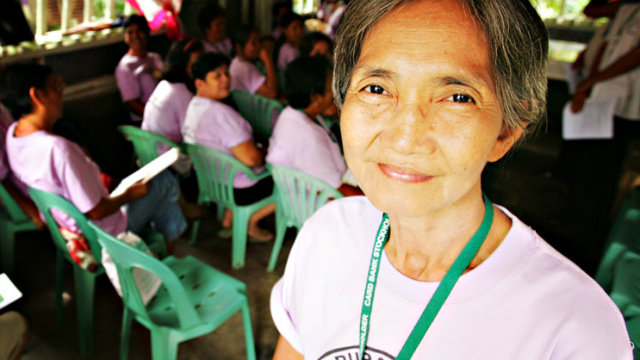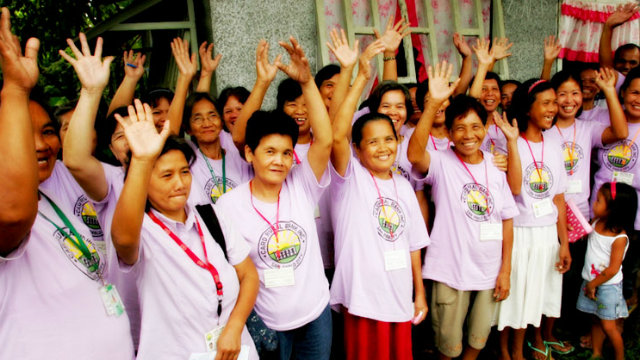SUMMARY
This is AI generated summarization, which may have errors. For context, always refer to the full article.

MANILA, Philippines – “If you’re poor in the Philippines, you’re not allowed to die.”
These were the words of Dr. Jaime Aristotle B. Alip, the Founder and Managing Director of the Center for Agriculture and Rural Development Mutually Reinforcing Institutions (CARD MRI), the largest microfinance institution in the country.
Click here for live blog of the APEC SME Summit where various entrepreneurs from Asia spoke.
Click here for a replay of the APEC SME Summit speeches.
Click to read: 7 Lessons for entrepreneurs from Asia’s best
Alip said most poor Filipinos in the country do not have access to capital to start small business or affordable insurance. This gives them very little or nothing to spare for funeral expenses or inheritance to leave their families behind in case they pass away.
This is what he wanted to change when he started CARD, 27 years ago.
CARD offers microfinance loans and affordable insurance to women. Their loans are usually used to finance the poor’s entrepreneurial pursuits while microinsurance gives them the opportunity to insure themselves, their families and their property.
“I found out when you’re working with the poor, if they die, they don’t have decent collateral. You know, if you’re poor in this country, you’re not allowed to die because you will not have a decent funeral,” Alip said during the APEC SME Summit on January 20.
“I’m not in the business of e-banking. I’m not in the business of e-commerce. I’m not even in the business of manufacturing. My business is poverty eradication,” he added.
The dream
Alip said his dream was to put up a bank that is owned and managed by the poor in the Philippines. So in 1997, with his P20 or, at that time, $1.20, and a ‘magic’ typewriter in tow, started churning out proposals to banks, asking them if they will allow him to borrow money for his ‘crazy’ pursuit.
He said, back then, his proposals were often rejected. Alip said this is because his concept went against conventional banking wisdom – requiring less paperwork, steps, very little loan amounts, and – the most important thing – no collateral.
Alip said he lent women entrepreneurs as little as P3,000 or P5,000 to put up a piggery or any backyard business. Many saw the opportunity and sought the bank’s help.
By the end of December 2012, Alip said CARD has served 2 million last year and a total of around 10 million poor Filipinos since it started. This constitutes around 10% of the population of the country.
Alip added that the repayment rate of women entrepreneurs to CARD is at 99.35% while CARD’s repayment of its loans from big banks such as Bank of the Philippine Island, Metrobank, Banco de Oro (BDO), and RCBC, among others, was at 100%.
“Why women? why not men? The moment you give loans to the poor women, their first priority, when they have increase in income (is) food for the children, education for the children, shelter for the family and that to me is what development is all about. The men, we are very, very sociable by nature. Our first priority is to show off to the community ‘hey guys, I have increased my income, let us drink together'” Alip said.

Empowering poor women
Alip said there is more to CARD than just microfinance and micro insurance. The bank also extends education scholarships to members who would like to continue their education and deliver weekly financial education nationwide.
He said recently CARD saw two of their members graduate from high school, with honors. One member graduated Valedictorian of the class while the other one, who graduated with her children, was awarded 5th honourable mention.
Alip also said the bank sees to it that it touches base with its members through monthly meetings. During these meetings, members also receive accounting, banking, and financial education to guide them in their businesses.
These lessons and the access to credit from CARD allowed some members to grow their businesses. There was even one member who started with a loan of only P3,000 but is now borrowing P300,000 for her egg production and handicraft businesses in Marinduque.
“I believe also that not only access (is important) but control of credit resources. That, for me, is more empowering. Give them ownership of the bank. Thats why the whole CARD group is substantially owned by members. To me, I’ve always believed in the old Chinese golden rule, he who has the gold, rules. Therefore if the clients are poor, give them access, give them ownership, (and) they will be empowered because they can dictate their own destiny in life,” Alip said.
Today, he said, CARD is present in around 1,400 branches nationwide. However, these branches are not located in key urban centers or cities in the Philippines – all of these branches are located in hard up places that are hungry for capital and development.
Alip said CARD is present even in the far reaches of the Philippines like Jolo, Tawi-Tawi, and even Sitangkai, which is only a 30-minute boat ride from Malaysia. He added that his organisation is also helping poor people in other countries like Vietnam, Indonesia, and Hong Kong, where the clients are mostly Overseas Filipino Workers. – Rappler.com
Add a comment
How does this make you feel?





There are no comments yet. Add your comment to start the conversation.